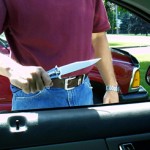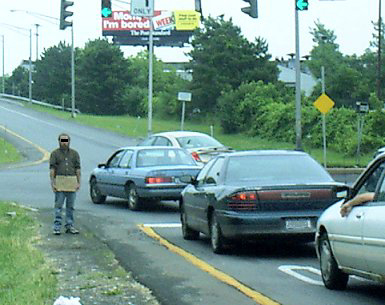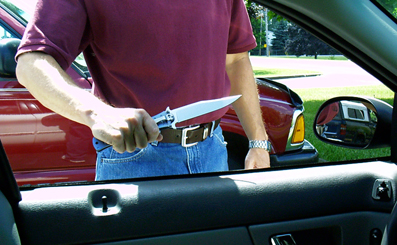 There are some common confrontations with which you should be familiar when you are out and about. These are a few of the simple pieces of advice I offer to anyone relatively ignorant of self-defense and awareness, when the topic comes up in conversation. Often these are things people simply don’t consider. If you’re a regular reader of The Martialist, these things shouldn’t be news to you. They’re worthwhile as reminders, though.
There are some common confrontations with which you should be familiar when you are out and about. These are a few of the simple pieces of advice I offer to anyone relatively ignorant of self-defense and awareness, when the topic comes up in conversation. Often these are things people simply don’t consider. If you’re a regular reader of The Martialist, these things shouldn’t be news to you. They’re worthwhile as reminders, though.
OFFRAMP BEGGARS
Anyone who drives in urban and suburban areas will, sooner or later, be confronted by one of the more obnoxious manifestations of panhandling — offramp beggars. I say “obnoxious” because I find it particularly galling that someone would both ask for money and ask in such a way that those inclined to give must put themselves at great physical risk to do so.

Offramp beggars pose a serious risk to those inclined to charity.
You are never in more danger than when seated and belted in your automobile, stopped, with your window down and another human being standing nearby. You have very little mobility and even less leverage sitting in your car.
In Texas, an uproar occurred when a holder of one of the state’s then-new CCW permits shot and killed another person in a “traffic dispute.” What didn’t always make the left-leaning news reports of this example of “gun violence” was the fact that the shooter fired in self-defense. He was sitting in his car when a road-raging fellow traveler reached into his open and window and started striking him repeatedly.
Being struck in the head again and again can result in serious injury, permanent blindness, and even death. The armed citizen knew this and reacted accordingly. Given his relatively helpless nature sitting in the car, his gun was really the only option available to him. This emphasizes just how big a disadvantage you face when sitting while attacked by a standing assailant, especially if your strapped in and going nowhere.

That open car window is a liability when you’re stopped.
Now, consider an offramp. If you’re trapped at the light at the bottom of the ramp, the beggar has a captive audience. He can approach your vehicle and there’s little you can do about it except refuse to roll down your window. Most of the time, this is sufficient to protect you — but remember, few car windows are brick-proof.
If you think you’re going to drive away when a threat appears, forget it — unless you’re keen on trading a mugging for a car accident. You’re stopped at that light for a reason. If there aren’t cars both in front of and behind you, chances are you’ll have to pull into oncoming traffic to drive against the light.
To give that offramp beggar money, you must essentially offer him your throat in complete trust. Reaching through your own car window to hand him a dollar, you are totally vulnerable.
Never give money to panhandlers, especially if you’re in your car. It is not worth the risk. You may successfully give money to scores of street people before encountering one who’s inclined to do more than quietly take what you volunteer — but why subject yourself to unnecessary danger? You have family and friends who count on you. Your continued health and well-being is more important than that of someone rude enough to corner people in their cars.

This panhandler was not pleased to see my camera.
The same is true when you are approached outside of your car. Again, never give money to panhandlers. For one thing, at least one of your hands is occupied when you hand something over to someone else. For another, you are telling the panhandler that you have money when you give him some of it. Oh, and please, for the love of all that is holy, do not take out your wallet and start selecting a suitable donation from your available funds. You might as well wear a sign around your neck that says, “Rob me.”
The assumption, when dealing with street people, is that the majority of them have mental problems, chemical dependencies, or other issues that make them a potential danger to you. Even if you successfully and peacefully give money to scores of them, sooner or later you will meet one who wants more than you are willing to give.
Many of the hard-luck stories beggars tell you are con games and nothing more. How can you tell? Most of them commit the classic error of offering too much information. The more elaborate the song and dance, the more complicated the backstory justifying the begging, the greater the probability that the whole thing is bogus.
GOT THE TIME?
If you’re obviously wearing a watch, you have two choices when asked for the time. You can be rude and refuse to give it, or you can comply with the request. The problem is that when approached on the street by a stranger, there is a chance — not a great one, but a real one nonetheless — that someone who asks you for the time is trying to distract you in order to assault you. Think about it: when you look at your watch, you typically look down at your arm, making you an easy target.
If someone you don’t know comes up to you and asks you for the time, you can easily minimize your risk. Step back casually, away from the stranger, preferably blading your body as you do so. Raise your arm rather than lowering your head, keeping that arm well away from your body and between you and the other person. In this way you can read the time while keeping your guard up.

Practice doing this so it looks casual rather than confrontational. There’s no need to drop into your Daniel-san crane stance and fire off a flurry of snap kicks just to tell someone they’re late for an appointment.
GOT A LIGHT?
The answer to this question is no, you don’t have a light. You do not, in fact, smoke, even if you do, if someone you don’t know wanders up to you on the street and asks you this question. (Now, if you’ve got a cigarette dangling from your mouth it’s going to be harder to deny that you smoke. This scenario assumes that a stranger has approached you and you have given no public indication that you have a source of flame on your person.)
There’s simply no way to light another person’s cigarette for them on the street without incurring an unacceptable level of risk, unless you’re willing to toss someone a lighter or a book of matches. (For you smokers, that’s one option. Pick up a handful of those free books of matches people still give away here and there, or buy a box at the store. Carry a couple in your pocket in addition to your lighter. When someone asks you for a light, you can toss them a book of matches (from a safe, casual distance) and even look generous by adding, “Keep it.”
Picture standing in front of someone, holding your lighter to that person’s cigarette. At least one of your hands — possibly two, if you’re cupping one palm against the wind — is occupied. You’re also giving that stranger a burning cylinder of tobacco with which he can put your eye out, if he’s so inclined. (That’s why cops will often tell you to put out your cigarette when they speak with you.)
PARANOIA AND PRUDENCE
These are just a few examples of scenarios in which you must be extremely careful in today’s world. Being mindful of these risks isn’t paranoid. It’s prudent. It’s sad that we must be concerned about such things, but the reality of our world is that you simply can’t trust people you do not know. Every one of these scenarios has been used before to victimize someone by playing on the individual’s basic decency, his or her desire to help others.
I am not advocating that you envision marauding ninja crouching behind every parking meter or draw down on every Girl Scout who wants to know how long it will be before her bus arrives. You’ve got to keep things in perspective.
That perspective, however, must include a recognition of the real dangers that exist in contemporary society.